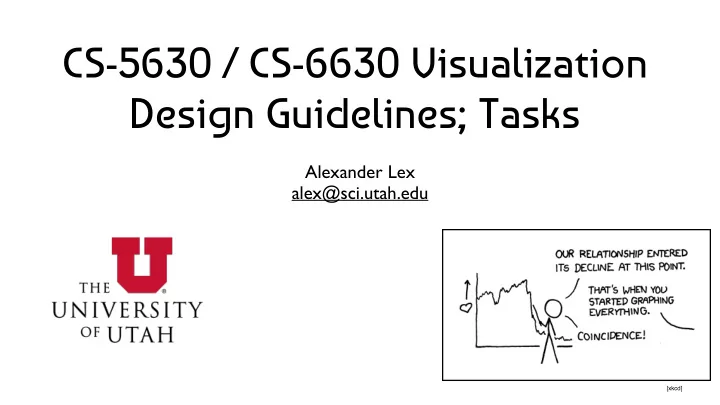

CS-5630 / CS-6630 Visualization Design Guidelines; Tasks Alexander Lex alex@sci.utah.edu [xkcd]
Design Critique / Redesign
https://goo.gl/lHWp4x Sunday Star Times, 2012
Quantity encoded by diameter, not area! Fixing that: R. Cunliffe, Stats Chat
But is this visual encoding appropriate in the first place? R. Cunliffe, Stats Chat
Design Guidelines
Edward Tufte
Design Excellence “Well-designed presentations of interesting data are a matter of substance, of statistics, and of design.”
Tufte’s Lessons Practice: graphical integrity and excellence Theory: design principles for data graphics
Graphical Integrity Flowing Data
Scale Distortions Flowing Data
What’s wrong?
Scale Distortions
Scale Distortions
Start Scales at 0? A. Kriebel, VizWiz
Global Warming? The Daily Mail, UK, Jan 2012
Global Warming? Mother Jones
Global Warming - Frame the Data Mother Jones
The Lie Factor Size of effect shown in graphic Size of effect in data Tufte, VDQI
The Lie Factor 5 . 3 − 0 . 6 / 27 . 5 − 18 = 14 . 8 0 . 6 18 (Size of effect in graphic)/(size of effect in data) Tufte, VDQI
The Lie Factor Tufte, VDQI
Tufte’s Integrity Principles Show data variation , not design variation Clear, detailed, and thorough labeling and appropriate scales Size of the graphic effect should be directly proportional to the numerical quantities (“lie factor”)
Death to Pie Charts Share of coverage on TechCrunch “I hate pie charts. I mean, really hate them.” Cole Nussbaumer www.storytellingwithdata.com/2011/07/death-to-pie-charts.html
Redesign
Can you spot the differences?
Can you spot the differences?
My favorite pie chart
My second favorite pie chart
Visualization Design Principles
Maximize Data-Ink Ratio 0-$24,999 $25,000+ 0-$24,999 $25,000+
Maximize Data-Ink Ratio 700 525 350 175 0 Males Females 0-$24,999 $25,000+ 0-$24,999 $25,000+
Avoid Chartjunk Extraneous visual elements that distract from the message ongoing, Tim Brey
Avoid Chartjunk ongoing, Tim Brey
Avoid Chartjunk ongoing, Tim Brey
Avoid Chartjunk ongoing, Tim Brey
Avoid Chartjunk ongoing, Tim Brey
Avoid Chartjunk ongoing, Tim Brey
Which is better? [Bateman et al. 2010]
Which is better? [Bateman et al. 2010] https://eagereyes.org/criticism/chart-junk-considered-useful-after-all
EXPERIMENTAL RESULTS 1. No significant difference between plain and image charts for interactive interpretation accuracy 2. No significant difference in recall accuracy after a five-minute gap 3. Significantly better recall for Holmes charts of both the chart topic and the details (categories and trend) after long-term gap (2-3 weeks). 4. Participants saw value messages in the Holmes charts significantly more often than in the plain charts. 5. Participants found the Holmes charts more attractive, most enjoyed them, and found that they were easiest and fastest to remember .
Use Chart Junk? It depends! PROS CONS persuasion unbiased analysis memorability trustworthiness engagement interpretability space efficiency
Don’t matplotlib gallery Excel Charts Blog
Tasks Why are we using Visualization?
Domain and Abstract Tasks Infinite numbers of domain tasks Can be broken down into simpler abstract tasks We know how to address the abstract tasks! Identify task - data combination: solutions probably exist
Tasks Analyze high-level choices consume vs produce Search find a known/unknown item Query find out about characteristics of item by itself or relative to others
Example 1 Find good universities with a high faculty student ratio. Identify high-ranked universities In this subset: compare universities & identify high faculty student ratio OR Derive a ranking with a high weight for faculty student ratio
Example 2 Contrast Harvard’s reputation scores with MIT’s Match up Harvard with Yale First, find Harvard and Yale, then compare their (two) reputation scores
Example 3 Find a combination of weights and parameters where Harvard is better than MIT Produce a new dataset by deriving from the input parameters
Result
High-level actions: Analyze Analyze Consume Consume discover vs present Discover Present Enjoy classic split: explore vs explain enjoy: casual, social Produce Produce Annotate Record Derive Annotate, record tag Derive: crucial design choice
Example: Annotate
Example: Derive
Example: Derive Country Club Club Continent Ronaldo Portugal Real Madrid Europe Lahm Germany Bayern München Europe Robben Netherlands Bayern München Europe Khedira Germany Real Madrid Europe Phogba Italy Juventus Europe Messi Argentina Barcelona Europe
Actions: Mid-level search, low- level query Search what does user know? Target known Target unknown Location Lookup Browse target, location known Location Locate Explore unknown how much of the data Query matters? Identify Compare Summarize one, some, all
Example Compare (& Derive)
Why: Targets NETWORK DATA ALL DATA Topology Trends Outliers Features Paths ATTRIBUTES One Many SPATIAL DATA Dependency Correlation Similarity Distribution Shape Extremes
Examples Trends: How did the job market develop since the recession overall? Outliers: Looking at real estate related jobs
How? A Preview Encode Manipulate Facet Reduce Arrange Change Juxtapose Filter Express Separate Select Partition Aggregate Order Align Use Navigate Superimpose Embed Map from categorical and ordered attributes
Recommend
More recommend